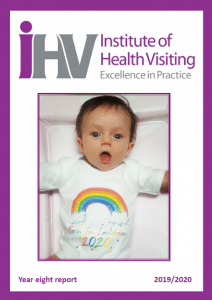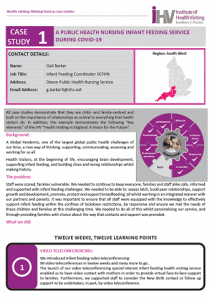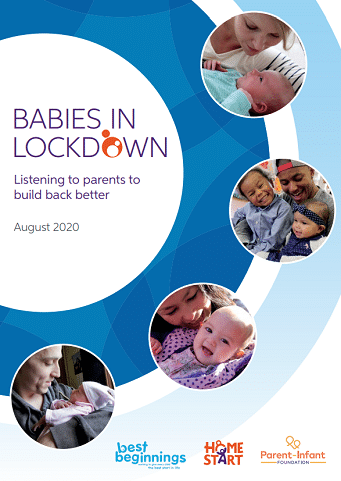According to a new survey from University College London (UCL), health visitors are concerned that the needs of children have been missed due to staff redeployment to support the COVID-19 workforce and increased caseloads.
The UCL survey of 663 health visitors in England, conducted between 19 June and 21 July 2020, found that 41% of respondents in teams that lost staff had between 6 and 50 team members redeployed between 19 March to 3 June 2020.
In approximately 10% of teams, which experienced a loss, this was a redeployment of at least half of their staff. Few teams (9% among those with staff redeployed) gained additional staff to fill the gaps. This meant that 253 respondents (38%) had their caseload increase, some with an increase of 50% or more, and 73% of those that experienced a change reported that their caseload had not returned to its usual size.
Dr Cheryll Adams CBE, Executive Director iHV, commented:
“The interim results of this research into the impact of redeployment of health visitors by University College London confirms all the anecdotal evidence already sent to the iHV by health visitors. Health visitors should never have been redeployed, instead their time should have been spent on reaching the most vulnerable families during lockdown and checking in on all other families. I don’t believe we yet fully know the impact of that period on children and families, but this research confirms that it was very significant for many families. Furthermore, there were significant impacts on the health visitors themselves, as those remaining strived to provide redesigned services and to reach the most vulnerable families, and those redeployed worried about the families they had left behind without opportunity for necessary handovers. I find the feedback on how the health of health visitors was impacted particularly distressing, this should not have been allowed to happen.
“Developmental reviews have now been delayed for more than four months and that too will mean that developmental delays are being missed and this could impact children for the rest of their lives. The already very diminished health visiting service in some areas of the country will be struggling to catch up whilst also juggling the challenge of maintaining their personal safety, and that of families. If we do face a second wave of COVID-19, health visitors must not be redeployed again. Instead, an urgent workforce plan is needed to rebuild numbers in the profession which are at their lowest for very many years and, alongside that, tackle the huge inequities in service delivery across England which have opened up over the past five years. It is not right that whilst children in some areas of the country continue to receive a reasonable service, children in many other areas now only receive a skeleton service, made even worse now by the challenges of service delivery during the COVID-19 pandemic.
“The first years of life lay down the foundations for our future health and wellbeing – get it right then and children will thrive and achieve at school and in the workplace; get it wrong, as we are now in England, and governments for many years to come will be paying for the consequences. The critical value of health visiting services is understood and invested in by the Scottish, Welsh and Northern Ireland governments. However, in England, it is not OK that an unwarranted variation of service quality has been allowed to open up as health visiting numbers continue to be allowed to plummet. I hope that the interim findings of this research will lead to prompt action. They have been published early as the researchers were so concerned by what they found.”
Dr Gabriella Conti, Associate Professor (UCL Economics and Institute of Fiscal Studies) who led the survey, said:
“Whilst all families are impacted by COVID-19, the most detrimental effects are felt by those who are already disadvantaged – in particular, our most vulnerable infants and children whose needs are often hidden from sight.
“Increased caseloads for a significant proportion of health visitors, along with reports of a lack of PPE for home visits, has created a lot of additional stress and anxiety, during a time of great uncertainty and difficulty.”
The researchers make a number of policy recommendations, including for:
- Health visiting services to be reinstated (where not already happening) to provide vital support and a safety-net for children, with appropriate measures put in place, including the use of PPE, to reduce the spread of the virus.
- An evaluation of the use of virtual, non face-to-face service delivery methods to determine their effectiveness for identification of vulnerabilities and risks, impact on child and family outcomes and reducing inequalities to inform future digital change.
- A clear workforce plan to ensure that the health visiting service has sufficient capacity to manage the backlog of missed appointments, as well as demand for support due to the secondary impacts of the pandemic.
- A proactive plan to ensure staff wellbeing during the restoration of services.
Research assistant Abigail Dow (UCL Economics) said:
“A cross-government strategy is needed to reduce inequalities and “level-up” our society. This will require investment to strengthen the health visiting service which plays a crucial role in the early identification and support of the most disadvantaged families.”
The survey, supported by the Institute of Health Visiting, was carried out using the online survey platform Qualtrics. Participants (98% female, 88% White British or Irish, and average age 50) were obtained with consent from the Institute of Health Visiting database. Data collection is still ongoing and a full report will be released later this year.











